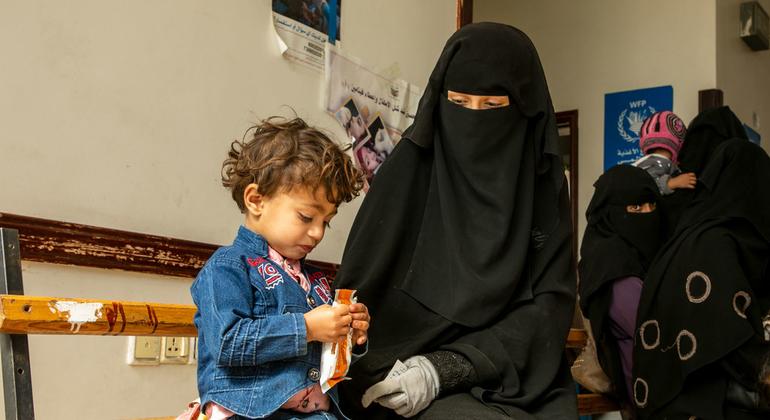UN and partners report rising acute malnutrition in government-controlled areas of Yemen


The sharp increase is due to diseases including cholera and malaria, severe food insecurity and limited access to safe drinking water and other essential services, the report said. Analysis by the Integrated Food Security Phase Classification (IPC) Technical Working Group.
Yemen has been mired in conflict and economic collapse for nearly a decade. As government forces, backed by a Saudi-led coalition, and Houthi rebels continue to fight, more than 18 million people, More than half the population needs humanitarian aid to survive.
Children are hungry
The report covers the period from November 2023 to October 2024.
The report found that the number of children under five years old in government-administered areas suffering from acute malnutrition increased by 34 percent compared to last year.
Overall, about 600,000 boys and girls were affected, of whom 120,000 were severely malnourished. In addition, about 223,000 pregnant and lactating women in these areas were found to be acutely malnourished.
For the first time, the most severe level of malnutrition – extremely critical acute malnutrition – was reported in two districts in the southern lowlands of Hudaydah province (Al Khawkhah and Hays), and another district in Taiz (Al Makha).
The report notes that Mawza district in the Taiz lowlands is also expected to join the group.
“These districts need immediate intervention to prevent increased morbidity and mortality in children under five,” experts said. speak.
Fear of famine
The report notes that Hudaydah and Taiz already face the highest rates of chronic malnutrition or stunting, and points out that persistent deprivation is also exacerbating chronic malnutrition among children there.
Furthermore, the rate of acute malnutrition in Hudaydah jumped to 33.9 percent from 25.9 percent in the same period last year.
The report predicts that all 117 districts in government-controlled areas surveyed, all in the south, will experience “severe” malnutrition or worse during the lean season from July to October.
Investment and support
“To protect the most vulnerable women, girls and boys, investing in and scaling up prevention and treatment efforts is more important than ever,” speak Peter Hawkins, UNICEF (UNICEF) Representing Yemen.
UNICEF, together with its sister agencies the United Nations World Food Programme (World Food Programme), Food and Agriculture Organization (Food and Agriculture Organization) and the World Health Organization (WHO), is calling for urgent support and action to address the root causes of acute malnutrition in Yemen by strengthening existing social protection, health, food and water, sanitation and hygiene systems.
At the same time, they stressed that ending the nearly decade-long conflict and restoring peace are crucial to addressing challenges and building resilience for the Yemeni people, who have been devastated by a lack of basic services, continued displacement, and a broken economic and social system.
‘A wake-up call’
Dr Hussein Gadain, FAO Representative in Yemen, reaffirmed the commitment to support “the restoration and sustainable diversification of agricultural livelihoods to help address urgent needs”.
Meanwhile, WFP is now forced to provide smaller rations in Yemen and the report’s findings “should be a wake-up call that human lives are at stake,” said Pierre Honnorat, the agency’s Representative and Country Director.
“It is vital to scale up support for the most vulnerable people who could fall further into food insecurity and malnutrition if current levels of humanitarian funding remain low,” he added.
Dr Arturo Pesigan, WHO Representative in Yemen, said the rising levels of acute malnutrition among children under five in Yemen also showed that disease was a growing concern.
Addressing health and nutrition emergencies requires “integrated health and nutrition services, including childhood disease management,” as well as ensuring full immunization and appropriate nutrition practices, he stressed.
“This also includes ensuring access to adequate nutritious food and safe drinking water,” he said. “Humanitarian actors and the international community must act immediately to protect the future of Yemen’s children.”


